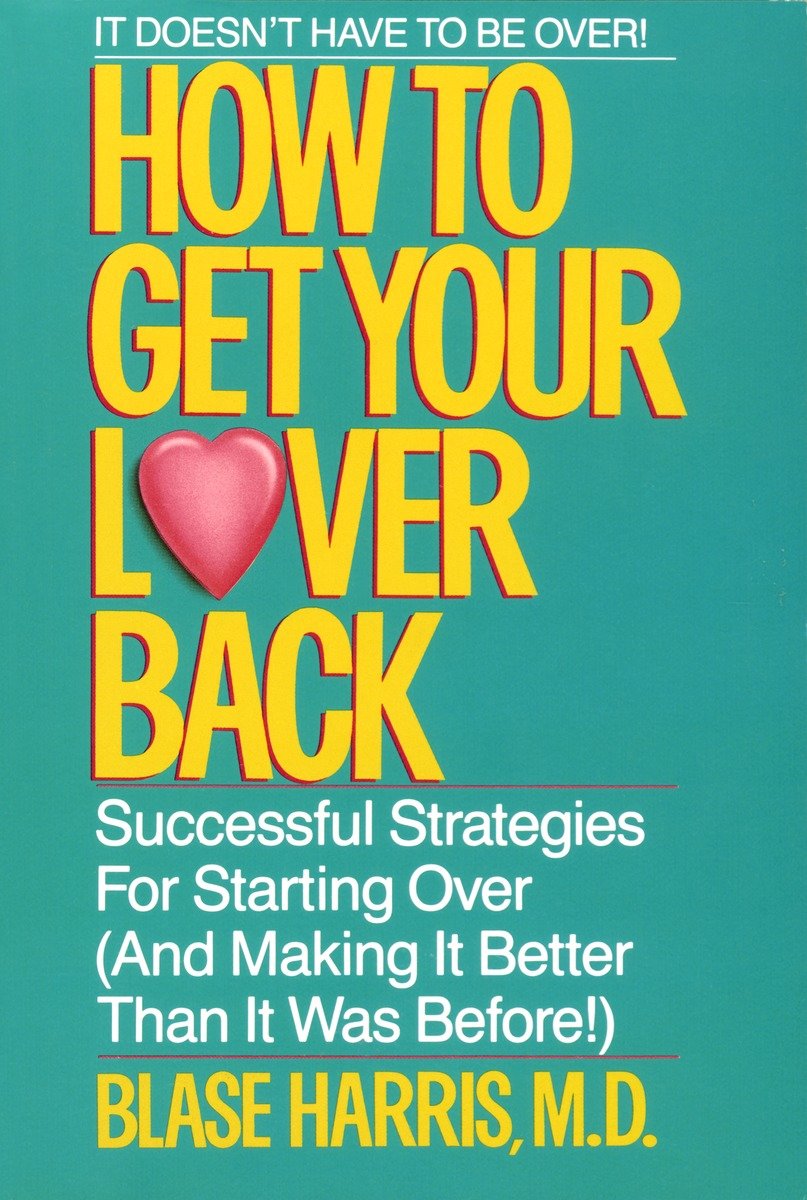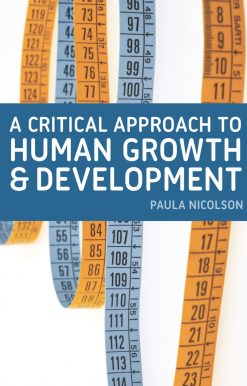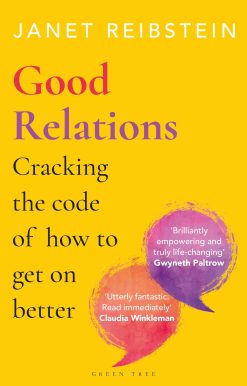How to Get Your Lover Back: Successful Strategies for Starting Over (& Making It Better Than It Was Before)
14.00 JOD
Please allow 2 – 5 weeks for delivery of this item
Description
If your lover has left you…If your relationship is on the edge, and you feel fragile and out of control…If you regret walking out…If you’re not sure you want your lover back, but you need to understand what happened…You do have a second chance–if you know what has to come first.Falling in and out of love is a natural process that can be understood and mastered. Love properly understood can be love regained and kept alive for a lifetime.This step-by-step approach developed by psychiatrist Blase Harris works. It has worked for the people in this book. And now it can work for you. Dr. Harris’s practical guide shows you how to avoid the common mistakes ex-lovers make, love 100 percent, and get your lover back!
Additional information
| Weight | 0.22 kg |
|---|---|
| Dimensions | 1.3 × 13.67 × 20.48 cm |
| PubliCanadation City/Country | USA |
| by | |
| Format | Paperback |
| Language | |
| Pages | 240 |
| Publisher | |
| Year Published | 1989-9-10 |
| Imprint | |
| ISBN 10 | 0440500893 |
| About The Author | Blase Harris has been doing in-depth psychotherapy since the early 80's, and has practiced psychiatry at a number of places around the country. He operates a full-time psychiatric practice on the Big Island of Hawaii. Harris received his degree from the University of Maryland School of Medicine. He did his early internship work at South Baltimore General Hospital, and finished his Residency Program at John Burns School of Medicine. |
| Excerpt From Book | Chapter 1 OKAY, SO YOU LOST YOUR LOVER “To wait an Hour—is long If love be just beyond— To wait eternity—is short— If love reward the end—” —Emily Dickinson Your lover may seem just beyond your grasp, and to pause a moment may seem an eternity; to scream about the grief that has been inflicted upon you may seem the natural thing to do, as if that would shorten the moment, as if that would get your lover back. Relax. The chance of getting your lover back lies in a different direction; it lies in a unique, uncommon response to losing a lover. Despite your grief, you can learn to love your lover back to you. However, grief and anxiety have a nasty way of impairing the ability to love. So, first, you must take a deep breath and calm down. If you have been in love with someone, no matter the length of time, watched the bond dissolve away, and now regret the loss, you can once again hold your lover in your arms as fully and closely in love with you as ever. This book will tell you how to do it. It is not a theoretical work, though theory will be alluded to. It is a practical guide. Too often we treat love as pure magic, undecipherable or decipherable only in some far-removed abstract theory. Love is so wonderful; we are in such awe of it that we feel we show it disrespect, degrade it or ourselves, if we try to analyze and understand it. Yet refusal to understand what we so highly value condemns us to swinging away in the dark like a blindfolded batter hoping to hit the ball, hoping, in fact, that someone has thrown a ball. If you are willing to step into the light and look at the nuts and bolts of how to get your lover back, you might succeed. Whether or not you are aware of it, there are basic principles of human interaction. If we do certain things in a specified situation, people are likely to respond in a predictable manner. Salespersons, politicians, and advertisers know this. Perhaps it’s time that lovers learned as well. Once you learn the principles and get down the techniques that apply those principles, your ex-lover may seem to respond as if he or she were a puppet on strings, but (WARNING!) if you start gloating over your newfound power and jerk the strings just for laughs, you could snap them and lose your lover all over again. There are definable skills involved in relationships, just as surely as there are skills in tennis, baseball, astrophysics, or driving a car. Most people are so little aware when it comes to what actually goes on in a real love-bond that even a very basic sort of knowledge will put you way ahead. And if, in the area of relationships, you develop a knowledge of basic human nature, your chances of success in getting your lover back are greatly increased. I have combined insights into the workings of the human heart with, believe it or not, basic sales techniques to develop the approach in this book. The difference between you and a salesperson is that you are not selling some object, for example, a car, that once sold, you can forget about. You are selling yourself as a desirable and loving person. You cannot afford to sell a lemon. False advertising will get you nowhere if true love is the goal. You are what you sell. You are telling someone that you love him or her. The surest way to convince is to demonstrate. If you have been rejected by your lover, you are probably suffering from the pain of a grief reaction. Your pain, need, and anger may block out everything else. Frustrated lovers are often very selfish. They are too caught up in their own anguish to begin to take meaningful steps to get their lovers back. This book is about how to take those meaningful steps. The goal of those steps is retrieval of a genuine love-bond. Nothing short of that will do. The goal is not merely physical cohabitation with someone you long for. The world is full of people living together who think they are in relationships with lovers but actually in their hearts they know that though they may be in a relationship of sorts, there are no “lovers” involved. A love-relationship based predominantly on guilt, pity, fear, need, habit, or some other love-substitute is worse than no relationship at all. A true love-bond is a growth experience and, ideally at least, involves healthy people. A love-bond is not something at which one desperately clutches. If your relationship has become a clutching one, then the bond that holds you to your lover will in time have little or nothing to do with love, and, in truth, you will then need to get your lover back as much as the person whose lover has already physically left. Falling in and out of love is not some kind of magic. It is a natural process that can be understood and mastered. Once you have been in love with someone, it is possible to remain so for a lifetime. Love properly understood can be love regained. This book will show you how. Dispel the pronouncements of your friends. Out of a genuine but misguided concern for your welfare, out of a projection of their own disappointments, or perhaps even out of an underlying jealousy, your friends and acquaintances may have assured you that there is more than one fish in the sea, more than one grain of sand on the beach. Those words are true, but empty! You are in love with a particular fish in the sea and a particular grain of sand. You can see the grain of sand in your hand, its own peculiar shape and facets and pattern of reflected light. It glimmers. That is the grain of sand for you. You are told, “You can’t make it happen.” Or, “If it was meant to be, it would be.” Such statements are as absurd as, “If you were meant to be a piano player, you would be able to play Bach as soon as you sat down to a piano.” Even your psychotherapist, if you have one, may be counseling you that the success or failure of this particular relationship is not the main concern. It may not be his concern, but it is yours. You lie awake nights thinking of this one particular relationship. When you fall asleep, you are plagued by dreams and nightmares. There are moments, especially when you wake in the morning to the fully conscious awareness of your loss, that your soul seems to have been sucked out of your chest and the color out of the world. You want to get your lover back. This is not necessarily an unhealthy wish. There is something therapeutic to be said for getting a lover back. In fact, there are very good reasons for attempting to get a lover back. You owe it to yourself to consider them. We can begin our discussion of these reasons by looking at what it is that brings lovers together in the first place. There is an old myth that there once was a time when each of us was whole, but we were cut in half, and each half spends its life looking for the other half. In our lovers we do, in a way, find our missing selves. The missing self could be a character trait, an attitude, or even a physical characteristic. It could be a spontaneity, an artistic sense, an enhanced ability to “feel” or intuit, or an ability to think analytically. So, is it true after all that opposites attract? Lovers are looking for their opposites, but in a special sense of the term. The “oppositeness” need not have anything to do with hair color, and so on. Lovers may very well look alike and be alike in many ways, but there is some essential way in which they are not alike. Your missing part found in another is what gives your love-bond “electricity.” Instead of envy for what we lack, envy is turned on its head and becomes love. (For a detailed description of the psychology of love as transformed envy, see psychoanalyst Theodor Reik’s Of Love and Lust.) A burst of joy comes from the discovery of our other self, and we fall in love. Our lovers don’t actually supply the missing half—at least not in a healthy relationship. They provide an opportunity for development of that part in ourselves or, if development is impossible, then a coming to terms with our lack. But the learning process is hard. In a relationship gone bad, love can revert to envy. We deliberately overvalue the part we already are and demean what we are not. Successful lovers use their knowledge of each other to create happiness. Unsuccessful lovers use the same knowledge to inflict pain. For example, if your lover is too controlled, you may need to learn a little of this control yourself, and, in turn, your lover may need to become more spontaneous. If things don’t work out, you become even less controlled. You find it difficult to discipline yourself to a schedule in order to achieve set goals. You lash out at your lover for his lack of spontaneity, making him more uptight about a spontaneous expression of feeling. When we are threatened, we retreat to the familiar. So your nonspontaneous lover becomes less spontaneous. This, of course, is just one, admittedly simplistic, example of how lovers can complement one another and accelerate growth or, if things go wrong, inhibit one another and impede growth. A lost relationship may be a lost opportunity for growth. A relationship regained can be a regained opportunity for accelerated growth for you and for your lover. |
Only logged in customers who have purchased this product may leave a review.






Reviews
There are no reviews yet.